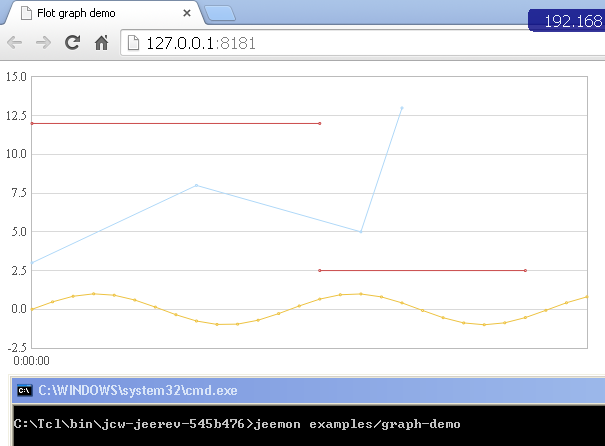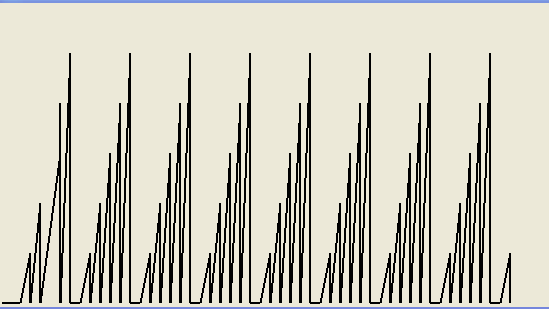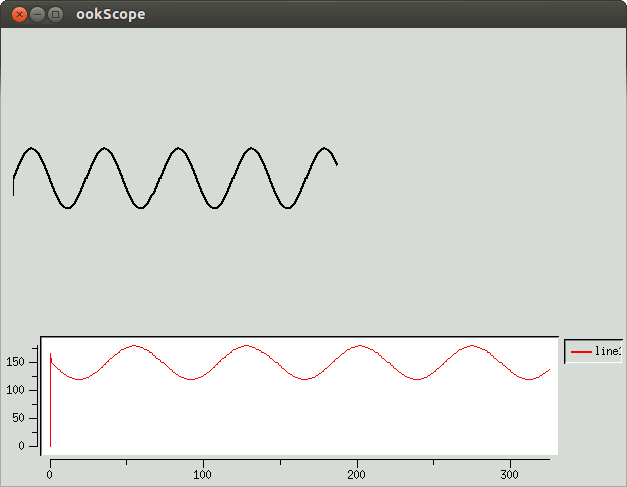JeeMon
JM Nov-16-2011 Some links to jcw's technical weblog, Tcl related in a very interesting way...
an inspiring site, to learn, to experiment, to share...
- Getting the required files
- Links
- Playing with JeeMon
- JeeMon and Arduino, a minimum example
- JeeMon and BLT (RBC)
Getting the required files
1. From the jeemon repository, I downloaded:
JeeMon-linux.zip
to my linux machine, since I have to build the Windows version from linux, as explained in the README.md file.
Then I copied the appropriate resulting zip file to my windows machine and unzip the file to get the jeemon executable.
2. From the jeerev repository, I downloaded:
jeerev-1.0.zip
to my Windows machine, in such a way that I get the following file structure:
C:\Tcl\JeeMon ├───drivers ├───examples │ ├───arduino1 │ ├───collectd-demo │ ├───driver-demo │ ├───graph-demo │ ├───hello-rf12 │ ├───hello-web │ ├───history-test │ ├───jeeudp-demo │ ├───kaku-send │ ├───niner-demo │ ├───peek-demo │ ├───replay-demo │ ├───table-demo │ ├───tree-demo │ ├───update-demo │ └───webfeed-demo ├───kit │ ├───cmds │ ├───lib │ │ └───udp │ ├───rigs1 │ ├───rigs2 │ ├───rigs3 │ │ ├───Interfaces │ │ └───Replay │ └───tm ├───macosx ├───stored └───tests
Notice that jeemon exe is there in the jeemon folder:
Directory of C:\Tcl\JeeMon
05/22/2019 06:57 PM <DIR> .
05/22/2019 06:57 PM <DIR> ..
05/22/2019 01:44 PM 84 .gitignore
05/22/2019 01:44 PM <DIR> drivers
05/22/2019 07:06 PM <DIR> examples
05/22/2019 06:46 PM 2,195,969 jeemon-win64.zip
05/22/2019 06:29 PM 4,693,427 jeemon.exe
05/22/2019 07:07 PM <DIR> kit
05/22/2019 01:44 PM <DIR> macosx
05/22/2019 01:44 PM 851 Makefile
05/22/2019 01:44 PM 13,998 NOTES.md
05/22/2019 01:44 PM 1,744 README.md
05/22/2019 06:29 PM 48 README.txt
05/22/2019 06:57 PM <DIR> stored
05/22/2019 01:44 PM <DIR> tests
7 File(s) 6,906,121 bytes
8 Dir(s)Links
| Inside JeeMon | 2009/04/14 | <link> |
| Sensor data coming in | 2009/08/25 | <link> |
| An OOK Scope | 2010/04/13 | <link> |
| Improved OOK Scope | 2010/04/17 | <link> |
| Oven temperature plot | 2010/05/14 | <link> |
Mid 2011: JeeMon evolved to version 1.5
| Playing with indentation | 2011/09/09 | <link> |
| RFM12B Command Calculator | 2011/09/18 | <link> |
| Hacking around in software | 2011/09/24 | <link> |
| JeeMon? JeeBus? JeeRev? | 2011/11/22 | <link> |
| What’s in the yellow box? | 2011/11/23 | <link> |
| JeeRev sits under the hood | 2011/11/24 | <link> |
| JeeMon for early birds | 2011/11/25 | <link> |
| Goodbye JeeMon | 2012/06/06 | <link> |
| Upload to JeeNode fixed | 2012/09/23 | <link> |
Playing with JeeMon
As I don't have any hardware to collect data, I had to replace the following part on /examples/graph-demo/main.tcl, in order to get the flot chart displayed:
Instead of this:
variable js {
var options = {
lines: { show: true },
points: { show: true },
xaxis: { mode: "time" },
legend: { position: "nw", margin: 3 },
shadowSize: 0,
grid: { borderWidth: 1, borderColor: "#bbbbbb" },
series: {
lines: { lineWidth: 1 },
points: { radius: 0.5 },
}
};
$.getJSON('data.json', function(data) {
$.plot($("#placeholder"), data, options);
});
}I used this:
variable js {
var options = {
lines: { show: true },
points: { show: true },
xaxis: { mode: "time" },
legend: { position: "nw", margin: 3 },
shadowSize: 0,
grid: { borderWidth: 1, borderColor: "#bbbbbb" },
series: {
lines: { lineWidth: 1 },
points: { radius: 0.5 },
}
};
$(function () {
var d1 = [];
for (var i = 0; i < 14; i += 0.5)
d1.push([i, Math.sin(i)]);
var d2 = [[0, 3], [4, 8], [8, 5], [9, 13]];
// a null signifies separate line segments
var d3 = [[0, 12], [7, 12], null, [7, 2.5], [12, 2.5]];
$.plot($("#placeholder"), [ d1, d2, d3 ],options);
});
}JeeMon and Arduino, a minimum example
This code is a light version of:
- An OOK Scope
- Oven temperature plot
(link above)
Arduino Code:
...place holder (just a for loop from 0 to 5, with a 1 sec delay in between each Serial.println)
main.tcl:
Jm doc "JeeMon and Arduino - a minimum example"
package require Tk
proc APP.READY {} {
# Called once during application startup.
wm title . "Select device"
ttk::treeview .all -columns {1 2} -show headings
.all heading 1 -text "USB ID"
.all heading 2 -text "Device"
.all column 1 -width 130 -stretch 0
.all column 2 -width 250
set count 0
foreach {id dev} [lsort -stride 2 [SysDep listSerialPorts]] {
puts "$id,$dev"
.all insert {} end -values [list $id $dev]
incr count
}
pack .all -expand 1 -fill both
bind .all <<TreeviewSelect>> [namespace which OokScope]
if {$count == 0} {
wm withdraw .
tk_messageBox -type ok -message "No FTDI devices found."
exit
}
update
after 2000
# nothing to choose, save right away
if {$count == 1} {
.all selection set [.all identify item 1 1]
}
}
proc OokScope {} {
set item [lindex [.all selection] 0]
if {$item ne ""} {
set devname [lindex [.all item $item -values] 0]
wm withdraw .
puts "connected to: $devname"
set conn [Interfaces serial connect $devname 9600]
oo::objdefine $conn {
# override connection to collect and display a histogram
method setup {} {
variable start [clock seconds] lastx 0 lasty 300
# create the GUI window
set w .ookScope
toplevel $w
canvas $w.c -width 600 -height 300
pack $w.c
}
method OnReadable {} {
variable start
variable lastx
variable lasty
# called whenever data is available to process the individual raw bytes
my variable fd w count minWidth maxWidth inbuf minPulses maxPulses series
foreach val [split [read $fd] "\n"] {
puts $val
set x [expr {([clock seconds]-$start) * 10}]
if {$val == ""} {set val 0}
set y [expr {300 - ($val*50)}]
.ookScope.c create line $lastx $lasty $x $y -width 2
set lastx $x
set lasty $y
}
}
}
$conn setup
}
}JeeMon and BLT (RBC)
I just had to copy rbc0.1.kit to kit/lib/rbc0.1 as explained on section "Starkit for Tclkit 8.4, 8.5 and 8.6 (Linux-x86 and Win32-x86)" on Refactored BLT Components
Arduino:
void setup() {
// put your setup code here, to run once:
Serial.begin(9600);
}
void loop() {
float x;
char texto[10];
for (long i=0;i<361;i=i+5) {
x = sin((i*3.14)/180);
dtostrf(x,5,2,texto);
Serial.print(i);
Serial.print(" ");
Serial.println(texto);
delay(1000);
}
}Tcl Side:
Jm doc "JeeMon and BLT"
package require Tk
source kit/lib/rbc0.1/rbc0.1.kit
package require rbc
proc APP.READY {} {
# Called once during application startup.
wm title . "Select device"
ttk::treeview .all -columns {1 2} -show headings
.all heading 1 -text "USB ID"
.all heading 2 -text "Device"
.all column 1 -width 130 -stretch 0
.all column 2 -width 250
set count 0
foreach {id dev} [lsort -stride 2 [SysDep listSerialPorts]] {
puts "$id,$dev"
.all insert {} end -values [list $id $dev]
incr count
}
pack .all -expand 1 -fill both
bind .all <<TreeviewSelect>> [namespace which OokScope]
if {$count == 0} {
wm withdraw .
tk_messageBox -type ok -message "No FTDI devices found."
exit
}
#update
#after 2000
# nothing to choose, save right away
if {$count == 1} {
.all selection set [.all identify item 1 1]
}
}
proc OokScope {} {
set item [lindex [.all selection] 0]
if {$item ne ""} {
set devname [lindex [.all item $item -values] 0]
wm withdraw .
puts "connected to: $devname"
set conn [Interfaces serial connect $devname 9600]
oo::objdefine $conn {
# override connection to collect and display a histogram
method setup {} {
variable start [clock seconds] lastx 0 lasty 300
variable Hz 200
variable xvec
variable y1vec
rbc::vector create xvec($Hz) y1vec($Hz)
# fill xvec with 0 .. $Hz-1
# xvec seq 0 [expr {$Hz - 1}]
# y1vec seq 0 [expr {$Hz - 1}]
# create the GUI window
set w .ookScope
toplevel $w
canvas $w.c -width 600 -height 300
rbc::stripchart $w.s1 -height 2i -width 8i -bufferelements no
$w.s1 element create line1 -xdata xvec -ydata y1vec -symbol none -color red
pack $w.c $w.s1
}
method OnReadable {} {
variable start
variable lastx
variable lasty
variable xvec
variable y1vec
# called whenever data is available to process the individual raw bytes
my variable fd w count minWidth maxWidth inbuf minPulses maxPulses series
if {[regexp {^.+ (.+)$} [gets $fd] -> val]} {
#puts $msg
#flush $fd
puts ">>> $val"
set x [expr {([clock seconds]-$start)}]
set xvec(++end) $x
if {$val != ""} {
set y [expr {150 - ($val*30)}]
puts "coord: $lastx $lasty $x $y"
.ookScope.c create line $lastx $lasty $x $y -width 2
set lastx $x
set lasty $y
set y1vec(++end) $y
}
}
}
}
$conn setup
}
}

